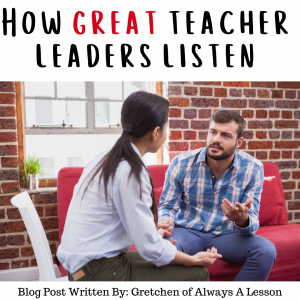How Great Teacher Leaders Listen
 One of the most underused superpowers for leaders is the act of listening. Focusing on instruction and pedagogy are a great foundation for successfully leading teachers. However, the simple response of listening while leading can immensely impact student achievement and teacher proficiency in the classroom.
One of the most underused superpowers for leaders is the act of listening. Focusing on instruction and pedagogy are a great foundation for successfully leading teachers. However, the simple response of listening while leading can immensely impact student achievement and teacher proficiency in the classroom.
Let’s dig into what it is (and isn’t), why it is important, and how teacher leaders can begin doing it right now.
Effective Listening: What it IS and ISN’T
Effective listening is being present in the moment and still in movement while giving direct eye contact. The act of pausing what you are doing to be fully immersed in a moment allows you to truly hear what is being communicated.
Effective listening is not thinking about what you are going to say, assuming what someone else is going to say, or multi-tasking while in a conversation.
The art of listening isn’t as simple as it may sound- plant your feet in the ground, give eye contact and quiet your mind and body. It actually requires constant intention and consciousness. Poor listening habits are an obstacle to overcome.
Why Teacher Leaders Need to Listen
To best help teachers meet requirements, implement initiatives with fidelity and develop their craft, teacher leaders have to listen. When teacher leaders know who their teachers are personally and professionally as well as understand their short and long-term goals, they can provide targeted support best aligned with that teacher’s trajectory.
Listening allows teacher leaders to hear what teachers are really saying when they communicate, through words and actions. They are able to peel back the layers to the root of any problems so that a solution can be found quickly. Plus, when teacher leaders listen, those they serve feel validated, important and valued. Those feelings in turn create motivation to work hard and collaborate towards the common mission or goal.
How Teacher Leaders Can Become Better Listeners
Below are tips to rewire your brain so that you can become an effective listener as you lead teachers each and every day:
-
- Make the decision to effectively listen. If you really want to improve as a listener, you have to make the conscious decision to get better. Making the active decision jump starts your brain in changing an old habit.
-
- Make effectively listening a physical reminder. Place a visual reminder in a place that you look often so that this new decision becomes top of mind as you move throughout the day (ie. a post-it note on a mirror, rubber band on your wrist, etc.)
-
- Reflect on interactions and make improvements. The fastest way to get better at something is to make continuous tweaks on your effort. Take time after interactions to rate yourself on how well you effectively listened. Give yourself feedback on aspects you want to strengthen during the next interaction (ie. eye contact, physical proximity, quietness, stillness, etc.).
-
- Ask for feedback. Let the teachers you lead know you are working towards becoming a more effective leader so that you can better serve them. They will be honored to help you hone your own craft by sharing their perspective on your skillset and tips on how you could get better. (FYI- Anonymous surveys might result in more honest feedback.)
-
- Celebrate growth. Don’t be too hard on yourself! Celebrate all forward momentum.
Great teacher leaders are effective listeners. It is a characteristic that develops over time and is highly treasured when it’s earned. Stay the course and you’ll see the positive impact it has on teacher retention and satisfaction.
If you are in need of additional resources to better support teachers, below are some recommendations:
What strategy have you implemented to become a better listener?

